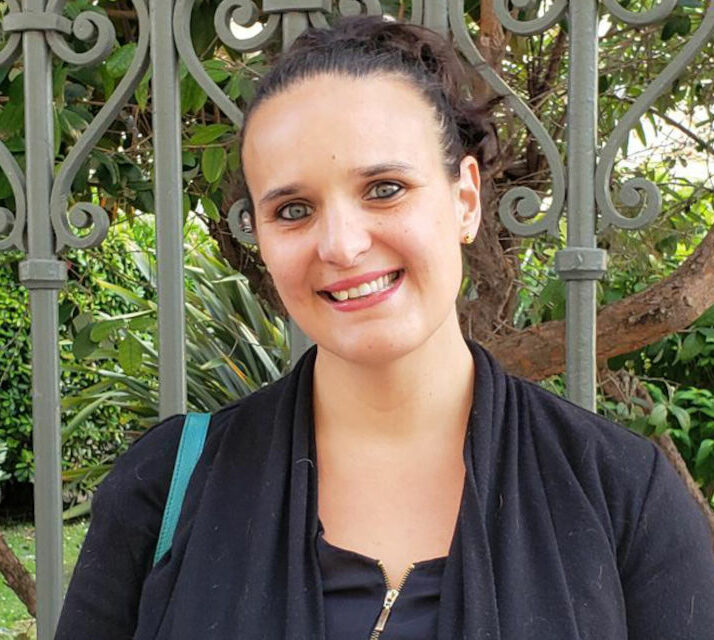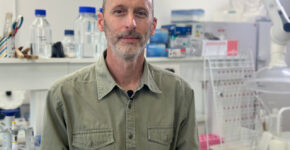Alexandra Garancher: understanding the immune environment of tumors to better eliminate them
A specialist in brain tumors, Alexandra Garancher is continuing her research into immunotherapy at the Montpellier Cancer Research Institute (IRCM) thanks to funding from Muse.

As is often the case in molecular biology, it all starts with Petri dishes and mice. For cancer researcher Alexandra Garancher, it was an undergraduate internship on cell differentiation that sparked her interest in laboratory research. It was the beginning of a vocation that shows no sign of waning 15 years later. The young neuro-oncology biologist is now a specialist in medulloblastoma (MB). This has nothing to do with the name of a villain from the latest Marvel movie: it is a malignant tumor that develops in the cerebellum of young children.
During her master's degree at the Institut Curie, her research revealed links between the mechanisms that regulate cell differentiation and the development of medulloblastomas. She continued this work in her thesis, where she identified a key player in oncogenesis and proposed an inhibitor that limits tumor development. This led to a publication in Cancer Cell, which provided an opportunity for her first collaboration with a laboratory in the United States. This opening across the Atlantic was not about to close, as the young doctor went on to spend six years as a postdoctoral fellow at the Sanford Burnham Prebys Medical Discovery Institute in San Diego, California.
Numerous research platforms
For Alexandra Garancher, the challenge is to broaden her research beyond tumor cells to encompass the entire immune environment of the tumor. In other words, to understand how the immune system interacts with tumor cells and how it could contribute to tumor elimination. This is a branch of cancer treatment research called immunotherapy. Her research focuses more specifically on immune evasion mechanisms: since MB is able to escape the immune system, how can it be made visible to T lymphocytes again? Her research led her to discover a cytokine capable of restoring a surface protein that had disappeared from the cancer cell (making it undetectable to T lymphocytes). This restored anti-tumor immunity and the effectiveness of certain therapeutic antibodies. Her work earned her an article in Nature Neuroscience and a patent!
"Alongside this research, I really enjoyed participating in a large-scale collaboration with the medical profession. As my work involved using cancer cells from patients grafted onto mice, we were able to test the effectiveness of treatments in the laboratory. Oncologists, surgeons, and bioinformaticians then worked together to make decisions about patient treatment," explains the researcher. She wants to continue this American experience at the IRCM, where she has held a position since February 2021. Although her applications in France resulted in several offers, it was the research environment in Montpellier that influenced her choice."Coming to the IRCM also meant taking advantage of its ties with the CHU, the Biocampus, and its many research platforms," says Alexandra Garancher. "When I applied, the IRCM also offered me the opportunity to spend a week here. I experienced a collaborative workspace that made me want to stay."
"Often more aggressive and resistant"
When asked about the future, her ambition becomes clear. "I have been working on MB for 10 years. The idea is to see if I can extend my discoveries to other tumors. In particular, breast cancer metastases. I would also like to continue to deepen my research on the immune environment, in particular to understand the effect of therapies (radiotherapy, chemotherapy, and immunotherapy) on the progression of cancer." Because while these therapies act on tumors, they can also have negative effects on treatment. For example, radiotherapy kills immune cells, thereby reducing the body's ability to defend itself. Unstoppable, the researcher mentions another area of research: improving the action of T lymphocytes on brain tumors to enable a better immune response.
She won't be able to do all this alone. At the IRCM, she plans to set up her own research team to carry out these projects. She is already looking for other sources of funding, notably by applying to ATIP-avenir and the ERC (European Research Council). The scale of the task does not seem to dampen her tenacity: "We still have everything to learn about the role of the tumor environment in the progression of cancers, while the emergence of recurrent tumors and metastases, which are often more aggressive and resistant, can have consequences that are sometimes more dramatic than the primary tumor."
